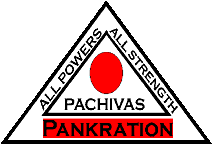
While PACHIVAS PANKRATION is considered a "FREE STYLE" sport, there are still rules and regulations that must be maintained to control excessive injury and to avoid the threat of death for competitors.

While PACHIVAS PANKRATION is considered a "FREE STYLE" sport, there are still rules and regulations that must be maintained to control excessive injury and to avoid the threat of death for competitors.
UNIFORM/GEAR REQUIREMENTS
ILLEGAL TECHNIQUES
LEGAL TECHNIQUES
LENGTH OF MATCHES
BEGINNER
LEVEL
(one-two years of training & at least a blue belt in rank)
Matches
will be five (5) continuous minutes
INTERMEDIATE
LEVEL (two-four years of training & at least a green belt in rank)
Matches will be seven (7) continuous minutes
ADVANCED
LEVEL (four or more years of training & at least a black belt in rank)
Ten (10) continuous minutes
CHAMPIONSHIP BOUTS No rank limitations, No time limitations.
METHODS OF VICTORY
DISQUALIFICATION
METHODS OF VICTORY DEFINED
Standing superiority - The fighter who has shown superior skills on the feet will be awarded one point and the opponent no points. In the case of equal display of standing skills, both combatants will be awarded 1 point.
Takedown superiority - The combatant who shows superiority in take downs will be awarded 1point and the opponent no points. In the case of equal takedown skills both combatants will receive 1 point.
Ground superiority - The combatant who shows superior ground fighting skills will be awarded 1point and the opponent no points. In the case of equal ground fighting skills both combatants will receive 1 point.
Total superiority - The fighter who controls most of the match action during the match will be awarded 2 points. In the case of equal amount of control during the match by both combatants, each combatant will be awarded 0 points.
The points will be totaled and the combatant with the most points will be judged as the winner by each individual judge. In the case of equal points awarded to each combatant, the judge will award a draw. The match will be judged by 3 licensed judges who will turn in their score cards with their name on the card at the end of the match.
The referee will award a decision based on the decision of the judges as follows:
Unanimous decision All 3 judges award a victory to the same combatant.
Majority decision - Two judges award a victory to the same person and the third judge awards a draw or one judge awards a victory to one person and the other two judges call a draw.
Split decision Two judges award a decision to one combatant and the other judge awards a decision to the other combatant.
Draw All three judges award a draw (equal points). Or one judge awards a decision to one fighter while the second judge awards a decision to the opposing fighter and the third judge awards a draw.
Opponent yells out "Stop". When a combatant yells out stop or in any other way indicates that they do not wish to continue, the referee will stop the match immediately and award the victory to the other combatant.
Referee's stoppage of the match The referee will consider both combatants safety at all times and may stop the match and award a victory to the appropriate combatant if he feels that the other combatant's safety is in danger and or injury is eminent and forth coming. This situation will be given particular consideration when a joint lock is being put on and the "locked" combatant refuses to "tap out" or "give up".
Stalemate. When the combatants are on the ground and neither is attempting to gain an advantage position or submission, then the referee will start a ten count, if the action does not pick up and the fighters are still not securing an advantage or submission by the end of the ten count, then a stalemate exists and the referee will break the combatants and restart them on their feet.
COMPETITION WEIGHT CLASSES
Super Heavyweight 220.1 lbs / 100.1 kg to No Maximum
Heavyweight 190.1 lbs / 86.1 kg to 220 lbs / 100 kg
Middle Heavyweight 175.1 lbs / 79.1 kg to 190 lbs / 86.kg
Light Heavyweight 167.1 lbs / 76.1 kg to 175 lbs / 79 kg
Super Middleweight 160.1 lbs / 72.6 kg to 167 lbs / 76 kg
Middleweight 154.1 lbs / 70.1 kg to 160 lbs / 72.5 kg
Super Welterweight 147.1 lbs / 67.1 kg to 154 lbs / 70 kg
Welterweight 140.1 lbs / 63.6 kg to 147 lbs / 67 kg
Super Lightweight 135.1 lbs / 61.1 kg to 140 lbs / 63.5 kg
Lightweight 130.1 lbs / 59.1 kg to 135 lbs / 61 kg
Super Featherweight 126.1 lbs / 57.1 kg to 130 lbs / 59 kg
Featherweight 122.1 lbs / 55.1 kg to 126 lbs / 57 kg
Super Bantamweight 118.1 lbs / 53.6 kg to 122 lbs / 55 kg
Bantamweight 115.l lbs / 52.1 kg to 118 lbs / 53.5 kg
Super Flyweight 112.l lbs / 51.1 kg to 115 lbs / 52 kg
Flyweight 112 lbs / 51 kg to No Minimum
WEIGHT
CLASSES ARE FLEXIBLE BASED UPON THE NUMBER OF COMPETITORS AND ARE TOTALLY
AT THE DISCRETION OF
THOSE INSTRUCTORS WHO ARE HOSTING THE COMPETITION
THE
INSTRUCTORS
ANCIENT
PANKRATION
MODERN PANKRATION
PACHIVAS PANKRATION
MEMBERSHIP